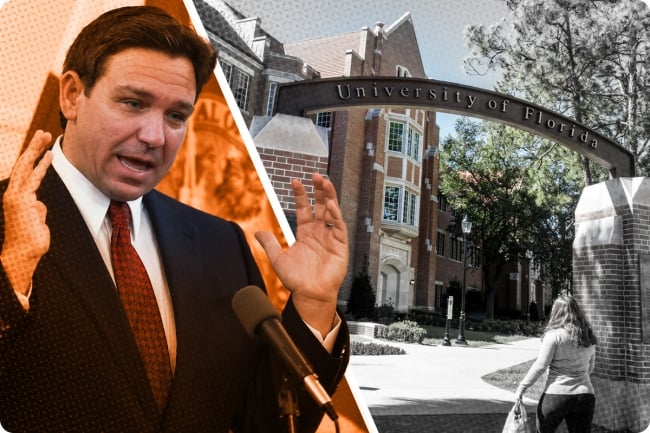You have /5 articles left.
Sign up for a free account or log in.

Florida governor Ron DeSantis and other Republicans have mandated post-tenure review at public institutions such as the University of Florida.
Photo illustration by Justin Morrison/Inside Higher Ed | Joe Raedle/Getty Images | Jeffrey Greenberg/Universal Images Group/Getty Images
Post-tenure reviews aren’t a new phenomenon in higher education. The American Association of University Professors has had a stance on them going back to 1983, and in 1999 it released a report saying they should be for “faculty development” and not “undertaken for the purpose of dismissal.”
Last year, Republican lawmakers in Florida passed a law requiring post-tenure reviews for professors at public universities. That wasn’t unique. But as with other policies, how administrators implement post-tenure review matters—and the board of the State University System of Florida determined that professors who receive the lowest review ranking, “unsatisfactory,” will “receive a notice of termination.” Now, the first round of post-tenure reviews has been completed. And the flagship University of Florida’s process produced a figure that has raised eyebrows among its faculty: About one-fifth of reviewed professors failed to pass muster or gave up defending their tenure.
“There’s no mincing words: Tenure’s gone. It’s been replaced by a five-year contract,” said Meera Sitharam, president of the United Faculty of Florida union’s UF chapter. She said UF’s implementation of the policy “really gives them a chance to get rid of people they don’t like.”
During a June Faculty Senate meeting, Provost J. Scott Angle provided what he called preliminary numbers on the results of the reviews—preliminary because then president Ben Sasse, a former Republican U.S. senator, could still change the scores professors received. Angle acknowledged that “the process was rushed this year” but said, “I think overall it probably was reasonably effective.”
Angle combined people who received the two lowest ratings, “unsatisfactory” and “does not meet expectations,” which puts professors on a performance improvement plan that can lead to their firing. When he added those to the professors who quit amid the process or decided to teach full-time, likely giving up tenure to do so, “in total, that was about 21 percent of the 258 cases that we reviewed this year.”
Those “cases” were people: It was the number of tenured faculty members up for review. As for the professors Angle mentioned who are “moving to become” full-time teachers, he said, “It’s my understanding that they would give up tenure—there’s still some job security for our master teachers, obviously.” He didn’t provide the faculty senators a breakdown of how many people would be relinquishing tenure in this manner.
The university did not grant an interview Tuesday with Angle or another administrator about these numbers. But it did provide a “final” July 1 report on the 2024 post-tenure review cycle that included numbers similar to what the provost had described.
The report said that, out of 262 professors up for review, 31 “either retired, entered retirement agreements or resigned during the review period.” A further 34 didn’t meet expectations and five were dubbed unsatisfactory. Add those categories up, and it’s 27 percent.
That document doesn’t say how many of those who quit during the review period did so because they feared they’d be fired anyway. And it doesn’t number the professors Angle mentioned as voluntarily giving up tenure to transition to full-time teaching roles. But it does suggest that post-tenure review will have a significant impact on UF’s workforce.
And UF’s numbers are much higher than at other Florida public institutions. Florida State University told Inside Higher Ed it placed zero in the “unsatisfactory” or “does not meet expectations” categories. And the Independent Florida Alligator student newspaper reported only around 11 percent in those categories at the University of Central Florida, 5 percent at Florida International University, 7 percent at the University of West Florida and 6 percent at the University of North Florida.
Though UF seems to be diverging from its fellow public institutions, it may be taking a cue from the state to get serious about post-tenure review.
‘Embellished’ Reviews
Early last year, Florida governor Ron DeSantis announced legislation targeting tenure. “The most significant deadweight cost at universities is typically unproductive tenured faculty,” DeSantis said.
In May of that year, he signed the controversial Senate Bill 266 into law. Along with banning Florida’s public colleges and universities from spending state and federal dollars on diversity, equity and inclusion programs, the law required post-tenure reviews every five years and said that faculty tenure, firings and other personnel decisions at public institutions can’t be arbitrated.
So the post-tenure review could lead to a professor’s ouster, and the professor could no longer arbitrate that decision. But Sitharam, the union president, said the statewide Board of Governors went beyond the law, which, she noted, “doesn’t even use the word ‘termination.’” And on top of that, she said, “my university has embellished the Board of Governors’ regulations.”
“Everybody that I know sees it as a destruction of the university and everybody’s scratching their head as to what the [UF] leadership is even trying to achieve,” Sitharam said.
One UF law professor, Steven Willis, is among the plaintiffs in a lawsuit filed July 30 against the State University System of Florida board and legislative leaders, seeking a judgment that the law requiring post-tenure review is unconstitutional. It’s unclear, though, whether a victory would lead UF to drop its own policy.
Willis said the post-tenure review doesn’t provide for due process, saying he gets only one page to respond to what his dean says about his scholarship over the past five years, one to respond about his teaching and one to respond about the service aspect of his job. “That’s ridiculous,” he said.
Willis said he’s a Republican and Christian who’s the faculty adviser for UF’s Christian Legal Society and its Federalist Society. He supports DeSantis, and he’s not opposed to post-tenure review. But “it needed to be designed with due process so that people had a chance to be heard and a chance to defend themselves,” Willis said, “and we don’t have that.”
DeSantis has criticized “woke” professors, cut off funding for DEI in public universities and championed a conservative overhaul of New College of Florida. In red Florida, left-leaning faculty members may feel they have more to fear if post-tenure review is used as a political tool.
But conservative-leaning defenders of academic freedom have noted that tenure is a way to protect the jobs of conservative professors at liberal institutions. Willis said that, if people are targeted, it’s not going to start with professors on the left. “At the moment nearly every college administration is dominated by the left,” Willis said. “In the short run, it’s people on the right, Republicans and Christians, and we are rare. That’s who’s going to get targeted.”




